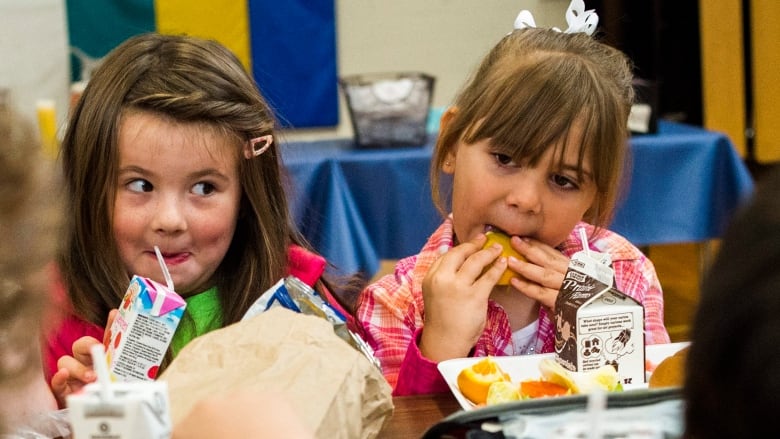Why Canada could benefit from a national school food program
Food Secure Canada is lobbying Ottawa to consider a cohesive school program as part of a national food policy

Canada is not doing well compared with other high-income countries at providing nutritious food to children, say food security advocates and parents calling for a national school food program.
In a UNICEF report published this summer, Canada ranked 37th out of 41countries on access to nutritious food for children, just below the United States and higher than Bulgaria.
Sasha McNicollisco-ordinator at theCoalition for Healthy School Food, organized by the advocacy group Food Secure Canada.
McNicollsaidCanada needs to improve its standing because schoolchildren are being harmed in these areas:
- Health Children tend to eat more unhealthy than healthy foods.
- Education Children who go to school without eating a nutritious breakfast are less likely to succeed in school, and facebullying, anxiety and depression, impacting their mental health.
"What we'd like to see is a national school food program where all kids from across the country know that they can go to school and get access to healthy food and eat it in an environment that teaches them about what healthy food means and about nutrition," McNicoll said.

Canada has just a patchwork of programs for school food programs, with funding coming from provincial and territorial governments, municipal governments and charities.
To that end, Food Secure Canadais seeking an investment by the federal government in a cost-shared universal healthy school food program,so students canhave daily access to healthy meals at school. The coalition ispresenting its position to Ottawa's consultations being held across Canada to help develop a national food policy.
McNicoll points to emerging research, which suggests the lunches children are bringing from home are not as healthyas the foods they're eating inschool programs.
- Canada needs national school lunch program, say advocates, CBC Radio's The Current
- Japan gets serious about 'eating education'
Zoe Traiforos observed lunch hour at her family's neighbourhood school in Toronto andsaid it was akin to "herding cattle," with high noise levels and hordes of children running down the hall to the gymnasium to eat.
Traiforos started a school nutrition committee to try to bring more order to lunch periodsin the hopes children will eat better. She thinks proper supervision of school lunches would help, but wouldn'tsolve the problem.
"It's been explained to me, 'Well sure, we can have more supervision at lunch but then we'd have to take away books from the library.' It's like an either/or. It's not a priority."
Traiforos said other parents are thankful for the committee, but many are too busy to participate.
- National lunch program needed, says UPEI food and nutrition professor
- 'We don't have any backroom meetings,' Health Canada says as Food Guide consultations end
- Junk-food tax alone won't trim obesity, researchers say
Making school food programs a bigger priority could help, Food Secure Canada says. It adds that Canada is the only industrializedcountry without a national school meal program.
Other countries take different approaches.
- In Japan, children serve each other at school.
- In Finland's national food school program, children are fed a balanced, healthy meal every day while sitting around a table in a communal way, as a supervisor teaches them about nutrition, healthy eating and about table manners.
- In Brazil, school food programs are mandated to procure 30 per cent of the food they purchase from small-scale local farmers.
By expanding current programs, Food Secure Canada hopes to reach more children. The group is working with a coalition of health groups, such as Heart andStroke, to advocate for school meals to be part of the national food policy thatOttawa hopes to have readynext year.
With files from CBC's Vik Adhopia












_(720p).jpg)


 OFFICIAL HD MUSIC VIDEO.jpg)
.jpg)



























































































